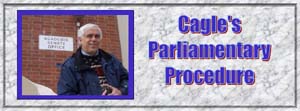
Link to Cagle's Questions page and index.
Link to Cagle's Parliamentary Procedure page.
Majority Vote
Hi. I'm a consultant and I've got a non-profit board of directors which is hung up on a particular decision. I am confused about which rules are dictated by the by-laws of the agency and which by Robert's Rules of Order.The bylaws of the agency would take precedence over Robert's Rules of Order Newly Revised. State and federal laws prevail over the bylaws.
The by-laws state that normally, a vote carries with a majority of those present provided that there is a quorum. However, for this particular vote -- one of the most important that the Board has to make -- a vote can only carry with a majority of the full board -- not the majority of the quorum.
Bylaws often contain such provisions.
The question is, can those board members who are absent submit their vote in advance in writing? The by-laws do not mention this. Does RRR address this?
Simple answer is no. Proxy voting is prohibited under Robert's Rules of Order Newly Revised (p. 421) unless the bylaws specifically provide for it (or some higher law requires it--which generally is not the case, but could be for a state agency or board.)
The board could pass a motion to have a mail ballot, which would enable those absent to cast a vote on an important question. This method is not a form of proxy voting, but a ballot procedure often used.
Quorum in a Church
"2/3 Present" Requirement
Dear Dr. Cagle,Article XVIII - Constitutional Changes (in my church constitution) reads:
- "This Constitution supersedes all former constitutions and resolutions of the congregation. Articles II, III, IV, X, XI, and XIV of this constitution are unalterable. The other Articles may be amended or repealed by a two-thirds majority vote of the members present at a regularly scheduled voters meeting after having been presented at the previous regularly scheduled voters meeting."
Does "presented at the previously regularly scheduled voters meeting" mean the exact wording of the change or could it mean the concept of the change? Thank you for your help.
I believe it would mean the concept of the change. The provision is for "previous notice" that the amendment will be considered and acted upon at the next meeting."Two-thirds majority vote" is an error, as there is no such thing in parliamentary law. It should read "Two-thirds vote."
The language means that two-thirds of all those present (minimally of the quorum number) is needed to pass an amendment.
Calculating 2/3 Vote
How is the easiest way to know if a vote passes with a 2/3 majority (should one carry a calculator?)? Thanks.To figure a 2/3 vote, the procedure is to divide the number of votes by 3 and multiply by 2 (rounding up on fractions).
A simpler calculation is to double the number of negative votes cast; if the motion receives that number or a higher number, then it passes by the necessary 2/3s.
Proxy votes
I am a member of a township republican organization. We are going to have a meeting regularly schedule meeting in which we will elect a new chairman. My question is in regards to proxy votes and if they are allowed or not. Our bylaws do not address the issue and refer to Robert's Rules. I can't find the answer there either. Our meeting is Saturday and I need your help.
Robert's Rules of Order Newly Revised does not allow proxy voting unless specifically authorized in bylaws. It adviases against using proxy voting in democratic organizations, as does most other parliamentary authorties. The objection is that there is no substitute for face-to-face deliberating and decision making in organizations.
Rationale for 2/3 votes
Hello, I understand that Robert's Rules of Order indicate that a motion to limit the rights of other members requires two thirds (as in a motion to limit debate) - what are the roots of that rule?
I don't have time for an extended answer, but the rationale has to do with preventing a majority from violating the rights of the minority in a meeting. The principle dividing majority from 2/3 votes is essentially as you describe it.
Return to Cagle's Questions page and index.
Link to Cagle's Parliamentary Procedure page.